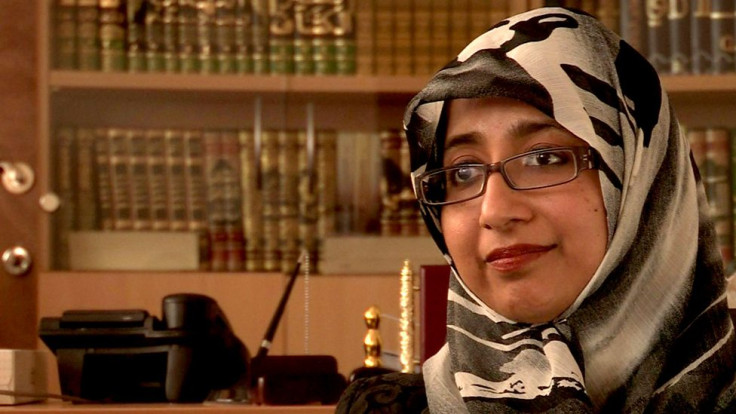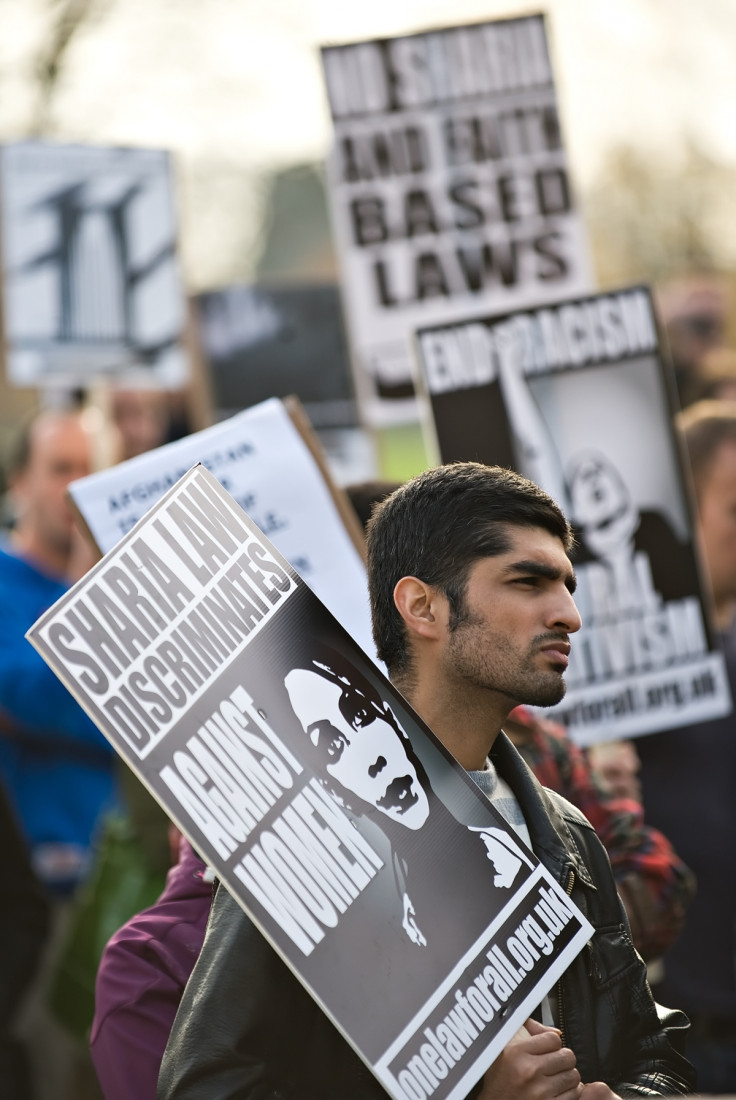Sharia law UK: 'Things are getting ugly for British Muslims' says Islamic court scholar Khola Hasan

Anjem Choudary was not there when Britain First banged on the door of the Islamic Sharia Council in 2015. A bemused staff member informed the would-be vigilantes that not only did a Mr Choudary have nothing to do with the Leyton-based centre, but he had never heard of him.
It is not an easy time to be a British Muslim, not least one involved in the country's oldest Islamic council. It is not just the members of Britain First and the English Defence League who are making noises about the role of Sharia law in the UK: at the highest levels of government – right up to David Cameron – calls for investigations are coming thick and fast.
And it is not only the right-wing press playing a role. In December 2015, the Independent ran a front page "expose" on the Sharia courts system that was based on a Dutch student's PhD thesis. It claimed the Sharia courts in Britain were shadowy, secretive and sexist, run by a cabal of angry, bearded old men passing judgement on Muslim women.
Khola Hasan is neither old nor bearded but she is angry. One of five senior Islamic scholars at the Islamic Sharia Council, her father Sheikh Suhaib Hasan established it in 1982 and she grew up playing in the rooms and corridors of the modest two storey building. She has become something of a spokeswoman for the wider Sharia system.
Inside Britain's Sharia courts, an IBTimes UK investigation

In a series of exclusive interviews and features this week, IBTimes UK investigates the scope and role of Islamic Sharia courts in Britain.
Speaking to Islamic scholars in London and the Midlands, pro-and anti-Sharia activists, politicians and British Muslims, this series explores the true role of Sharia councils and courts in Britain.
"I've had enough. I have been polite and I have held back but this was the straw that broke the camel's back. The problem is that whenever Sharia councils are in the news, the attack is not just focused on the councils, there is always an attack on Islam," said Hasan.
"Whatever the problems of the council, the reason is because Islam has a problem – Islam is misogynistic inherently, Islam is anti-Jews, it is anti-peace or inherently violent: that is the claim. Sharia councils being attacked is one thing but when it comes to a full-scale attack on my faith, that is something else. I take that personally."
The vast majority of the Leyton council's work covers divorces and the bulk of applicants are women, seeking to dissolve a Muslim marriage – or nikah – or resolve marital issues through mediation. A proper dissolution is as integral for issues relating to inheritance and child support as are personal closure and demonstrating to a family and wider community that a marriage is ended properly.
This is particularly important since as many as a third of Muslim couples in Britain have not had a civil service and are not considered married under British law. Unlike Jewish and Anglican religious ceremonies, Muslim marriages are not recognised by the state, so those who have not had a civil ceremony have no legal recourse to the British courts.
The centre also has a separate fatwa centre that receives up to 20 requests a week from British Muslims asking specific questions of scholars about practising Islam in a UK context. These are often about the hours of prayer or fasting, Hasan said, which are far longer in Britain (up to 18 hours if Ramadan falls in summer) compared to the original Muslim countries of the Middle East.
We are the new hated people and we are very aware of that. We are constantly trying to prove that we are not traitors
There is clearly a problem with Sharia courts in Britain, namely that all but a tiny proportion are local outfits in the back rooms of mosques, often presided over by imams with often questionable backgrounds in Islamic law. But Hasan is aggrieved that the Leyton centre, which is visited by Muslims from across Europe as well as the UK, has been tarred with the same brush.
"We don't know many [Sharia councils] there are in Britain. Most of the smaller councils are not registered in any way. They are private little organisations that have been set up in the back room of a mosque [or] in the house of an imam. [They are] completely below radar," she said.
It is also true that 99.9% of Sharia council judges are men, and while Hasan will not admit it, she is somewhat of a trailblazer. A vast majority of British Muslims come from the Indian subcontinent and, as such, follow a more conservative interpretation of Islam than those in Egypt or Malaysia where female court judges are more common.
Indeed, when Hasan first started working at the council, she encountered some hostility from clients who would assume she was either a secretary or at least not a scholar. When her four colleagues travelled to Saudi Arabia, they had to deny her existence altogether. But the fact that as many as 80% of the clients who visit Leyton are women – men do not need to go to court to be granted a divorce in Islamic law – means her gender is more often a help than a hindrance to her work.

But while her status as one of the only female Sharia council judges in Britain may be seen as progressive – even liberal – Hasan still considers herself a conservative. She openly defends polygamy despite the fact that it is available to men and not women and she concedes that the Quran does not rank the sexes equally, due to the fact that women carry children and men do not.
At the same time, Hasan is clear that she would not permit her husband to take a second wife ("I wouldn't stand for it – like many women," she says firmly) and she believes the misogyny present in some interpretations of Islam – such as the Wahhabi tradition in Saudi Arabia – is just that, an interpretation, and a misinterpretation at that.
Her father named her Khola after a female warrior who fought alongside the renowned general Khaled bin al-Waleed, wielding a sword atop a horse while still clad in her hijab. She points to a line of Muslim scholars all the way back to Aisha, the Prophet Mohammed's wife, who led the movement briefly after his death and whose descendants, through Ali, formed the Shia strain of Islam.
For Muslims now it is about keeping under the radar, sitting tight and just hoping that this blows over without many of us being killed. I am not sensationalising this, people are terrified
Hasan sees the rights of women as enshrined in the Quran and their violation as a modern phenomenon, born out of the hundreds of years of confusion that followed the colonisation of the Middle East by the West. It was this, she argues, that created inequality between the sexes in the Muslim world – not Muslim scholarship and certainly the teachings of Mohammed.
"I am part of a tradition that has been there since the beginning. I haven't invented anything new, there was a break in the tradition. The rights of women were lost when the French were in Morocco and Algeria and the British were in India. The Muslim world coped by retreating into a cell and thought that the only way to save itself from onslaught was to lock its daughters away," she said.
But Sharia law has an image problem in 2016 and debates about the origins of sexism and Islam are not likely to change that. Hasan may be angry but she says British Muslims are choosing to ride out the wave. Friends have had their hijabs ripped off in the street, while somebody threw a beer bottle at her just the other day. Britain's streets, she said, are getting ugly.
"I've been called a member of Isis. It is very hurtful and scary. [We] are the new hated people and Muslims are very aware of that. We all feel not only how much we are hated but how huge the job is. We are constantly trying to prove that we are not traitors," she said.
"For Muslims now it is about keeping under the radar, sitting tight and just hoping that this blows over without many of us being killed. I am not sensationalising this, people are terrified."
On 27 January, IBTimes UK interviews Sheikh Faiz-ul-Aqtab Siddiqi , the founder of the Muslim Arbitration Tribunal (MAT)
© Copyright IBTimes 2025. All rights reserved.






















